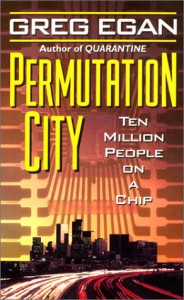Permutation City
 Permutation City by Greg Egan
Permutation City by Greg EganI don't read a lot of hard sf because my understanding of science is rudimentary at best, but I do tend to enjoy it when I read one that do not go too far over my head. I feel I only need to understand the basic plot and the characters' motivation, the whys if not the hows of it. If those conditions are met then my patchy understanding of the scientific details is not too much of an impediment and the bits that get through to me tend to be quite fascinating.
So it is with Permutation City which had me hooked from Chapter One which takes place inside a computer (no, not the plastic casing!) and is told from the point of view of a simulated personality, a software version of the protagonist. The opening scene where this simulated man "wakes up" and feel an unbearable disconnection from reality is like nothing I have ever read before. The story of this book is based on the author's "dust theory" which posits that:
"There is no difference, even in principle, between physics and mathematics, and that all mathematically possible structures exist, among them our physics and therefore our spacetime." (Wikipedia)
If I understand this theory correctly it means that there is no difference between a simulated person (called a "Copy" in this book) constructed from mathematics and the original flesh and blood person. To experiment on or delete such a person would be cruel and unethical, not to mention absolutely beastly. Virtual Reality as portrayed in this book is actually a layer of reality where actions tend to have consequences which are just as "real" to the people in this environment. Without going into the synopsis this book is essentially about what constitute reality, an examination of the nature of the consciousness, and the implication and psychological impact of digitization of personalities for the original people and the "Copies".
The sf trope of digitizing or simulating personalities utilized so well in Richard K. Morgan's [b:Altered Carbon|40445|Altered Carbon (Takeshi Kovacs, #1)|Richard K. Morgan|https://d.gr-assets.com/books/1387128955s/40445.jpg|2095852] is done even better here. For me the sticking point of this trope is that I do not believe that the digital version of myself would really be me regardless of the accuracy of the backup, if I am dead and gone the digital replacement would bring me back to life. There is no "right answer" to this question, it depends on your personal belief. However, the issue is very well explored here:
"To me, spending hundreds of thousands of dollars for the chance to be imitated by a computer after my death is just … farcical. I’m not an eccentric millionaire, I don’t want to spend my money – or yours – building some kind of … talking monument to my ego. I still have a sense of proportion."
‘I do believe that Copies are intelligent. I just wouldn’t say that they are – or they aren’t – ‘‘the same person as’’ the person they were based on. There’s no right or wrong answer to that; it’s a question of semantics, not a question of truth. "
"Being scanned wouldn't make me feel any better about dying. Whatever a Copy of me might think, if one was ever run.’
... and much later on in book:
"Copies, like funerals, were for the benefit of the survivors"
There are also many brilliant other concepts in this book. How time can be slowed down in the virtual world (the word "cyberspace" suddenly seems a bit quaint) so that the time in reality just whizzes by. There are "slow clubs" and slums for "Copies" of less well to do people who can not afford the expense of running their virtual counterparts in or near real time. Also the launching of an entirely new virtual universe.
What ultimately makes this book worthwhile for me though is that it is about people and the "effects of technology on the human condition". This may be the first sf book that seriously consider the philosophical implications of what the author calls "conscious software"*. I am always fascinated by the theme of how technology can change what it means to be human, and in order to explore this theme properly the characters need to be well developed and believable. If they were just flat devices to service the plot it would render the theme completely ineffective. Egan did a very good job with characterization here, few of the characters are actually likable but they have their own virtues and flaws.
As usual much of the science is beyond me and the book is completely devoid of humor (not a necessity but always a bonus in serious novels). but the book has given me plenty to ponder in the wee hours which is a great alternative to getting up to get ready for work. Definitely a worthwhile and fascinating read.
4.5 stars
* Related interview with author.
Excellent [a:Jo Walton|107170|Jo Walton|https://d.gr-assets.com/authors/1353809579p2/107170.jpg]'s review of this book.



